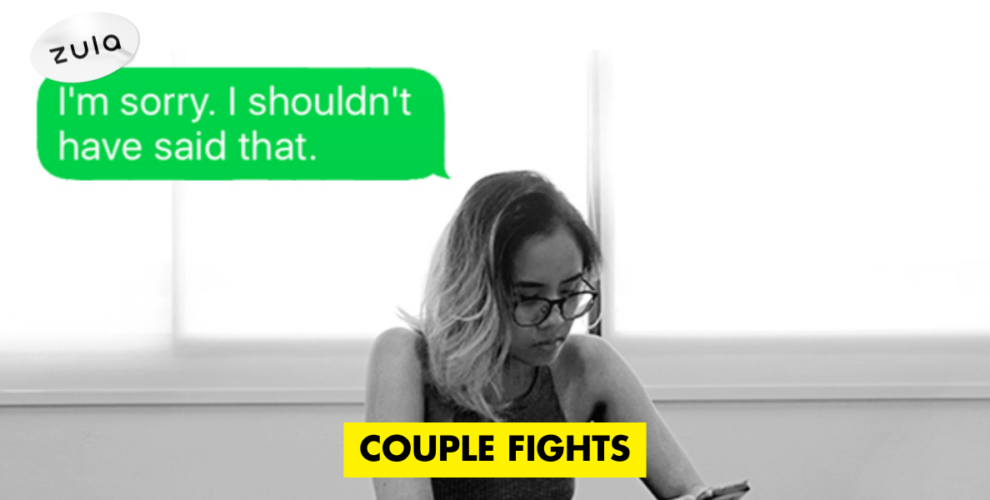Relationship Arguments
In every relationship, disagreements are bound to happen. Arguments are hard because more often than not, we’re too entrenched in our own opinions to listen to one another. Couple fights often end with one party throwing their metaphorical (or physical) hands up in exasperation and reluctantly conceding, while the triumphant victor flounces off with the classic phrase “I told you so.”
I’m the type to find every way to prove that I’m right. I only noticed this when my boyfriend cautiously mentioned that it seemed like I always had to win an argument, and would stop at no end to decimate the other party to prove myself right. Because of my aggressive argument style, he never wanted to bring up any contentious topics, as he knew he’d never win—or get through to me, for that matter. That’s when I realised that I needed to be more compromising, so I wouldn’t make his opinion feel unwarranted and unimportant.
I realised there were recurring patterns that resulted in a healthy compromise and here’s what I learnt.
Contents
Don’t argue when you’re emotional at 2am
It’s tempting to feed your emotions when the world sleeps and your mind wanders. But remember, almost nothing ever gets settled at 2am. When anger and frustration blind rational thought, you may say mindless things you don’t mean. In a vengeful state, spiteful words are said to get them where it hurts the most. The fleeting satisfaction gained from “winning” a fight is dampened when it ends, as we realise that we wounded the other party in the heat of the moment. Thinking and articulating calmly and clearly during a disagreement goes a long way. You’ll be able to rationalise, and come to a conclusion in a mature fashion without hurting someone else.
Watch your body language
When you’re defensive, your body language mimics that. Arms crossed, body turned away from the speaker, fists clenched—these are all tell-tale signs. The person you’re talking to will pick up on that and feel on edge. When you both get defensive, nothing will be resolved. Instead, face your partner, maintain eye contact, and keep your arms by your side. This will foster a more open and honest conversation.
Listen to each other
When both parties stop listening to one another, disagreements escalate into arguments. When we’re determined to prove a point, we forget to think from the our partner’s point of view. Since we haven’t been blessed with mind-reading abilities, listening is the only way for us to understand where they’re coming from. By showing that we’re paying attention to our SO, we assure them that their feelings matter to us. Reaffirming the person’s worth to you creates a positive environment, leading to a positive resolution.
Also read:
I Left The Love Of My Life And Bought A One-Way Ticket To Barcelona
Shutting yourself off is only a temporary solution
Sometimes, we may shut ourselves off, thinking it’d make our problems go away. But everyone, be it your mother or magazine advice column, will stress how important communication is in a relationship. As someone who doesn’t like to talk about how she feels, I know how big a difference it makes when you’re able to communicate your feelings to others. By sharing how you feel, you can help the other party empathise. Once you both establish how you feel about the situation, it’d be easier for you to compromise and come to a common consensus.
Leave the passive-aggression behind
This is a personal problem of mine. Growing up with parents that are very passive-aggressive, I tend to use passive-aggression as a method of defence. However, this tends to get very hurtful, as you indirectly target their weaknesses, and drag separate problems into the equation. This escalates into a full-blown fight, which no one wants. Instead, be direct and frank, but tactful. Consider the other person’s feelings, but get straight to the point so you can get to the root of the issue.
Let your ego go
I saved the best for last. Truly, the biggest challenge is to put your ego away. When your ego is bruised, you’ll start to see things more from “I” instead of “Us”. However, the Rolling Stones sang, “You can’t always get what you want”. Compromise involves a give and take: sometimes you’ll be the one giving more, other times, you’ll be the one taking more. Like the rest of the song goes, “but if you try sometimes, you just might find, you get what you need”.
Learning to Compromise
There’s no healthy relationship if two parties can’t compromise…unless your only true love is food. Without it, emotional energy gets drained, time gets wasted, and resentment may build between you. But if you play fair, you’ll both end up much happier, which is more important than always being right.
This article was first published on 1 February 2017 and last updated on 7 April 2024.
Also read:
We Are More In Love With The Idea Of Love Than The Person We Are With







